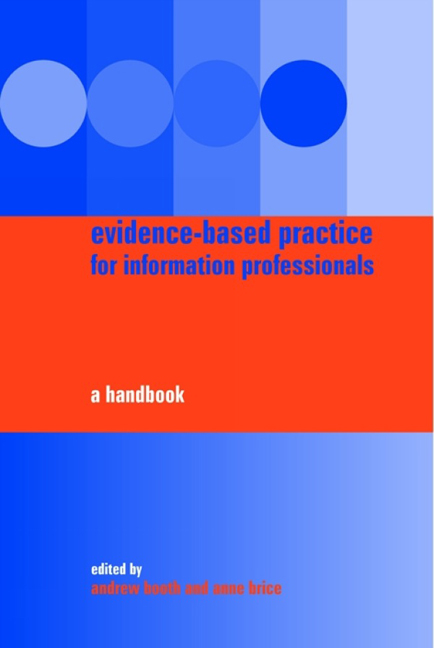Book contents
- Frontmatter
- Contents
- Foreword
- Editors and contributors
- Part 1 The context for evidence-based information practice
- Part 2 Skills and resources for evidence-based information practice
- Part 3 Using the evidence base in practice
- 13 Six domains of evidence-based information practice
- 14 Examining the evidence base for reference services and enquiry work
- Special Topic (A) Provision of a current awareness service for research staff (Guideline)
- 15 The contribution of evidence-based practice to educational activities
- Special Topic (B) How can I train my users? (Evidence Digest)
- 16 An evidence-based approach to collection management
- Special Topic (C) Electronic or paper: how do I manage my journals collection? (Evidence Digest)
- 17 Towards evidence-based management
- Special Topic (D) How do I measure the impact of my service? (Guideline)
- Special Topic (E) Should I charge and, if so, what should I charge for? (Evidence Briefing)
- 18 Evidence-based perspectives on information access and retrieval
- Special Topic (F) What are the characteristics of a good searcher? (Critically Appraised Topic)
- Special Topic (G) Which database, which interface? (Guideline) 251
- 19 Introducing an evidence-based approach to marketing and promotional activities
- Special Topic (H) Determining the information needs of practising nurses postregistration in the UK from 1990 to 2003 (Evidence Digest)
- 20 A future for evidence-based information practice?
- Index
18 - Evidence-based perspectives on information access and retrieval
from Part 3 - Using the evidence base in practice
Published online by Cambridge University Press: 08 June 2018
- Frontmatter
- Contents
- Foreword
- Editors and contributors
- Part 1 The context for evidence-based information practice
- Part 2 Skills and resources for evidence-based information practice
- Part 3 Using the evidence base in practice
- 13 Six domains of evidence-based information practice
- 14 Examining the evidence base for reference services and enquiry work
- Special Topic (A) Provision of a current awareness service for research staff (Guideline)
- 15 The contribution of evidence-based practice to educational activities
- Special Topic (B) How can I train my users? (Evidence Digest)
- 16 An evidence-based approach to collection management
- Special Topic (C) Electronic or paper: how do I manage my journals collection? (Evidence Digest)
- 17 Towards evidence-based management
- Special Topic (D) How do I measure the impact of my service? (Guideline)
- Special Topic (E) Should I charge and, if so, what should I charge for? (Evidence Briefing)
- 18 Evidence-based perspectives on information access and retrieval
- Special Topic (F) What are the characteristics of a good searcher? (Critically Appraised Topic)
- Special Topic (G) Which database, which interface? (Guideline) 251
- 19 Introducing an evidence-based approach to marketing and promotional activities
- Special Topic (H) Determining the information needs of practising nurses postregistration in the UK from 1990 to 2003 (Evidence Digest)
- 20 A future for evidence-based information practice?
- Index
Summary
Introduction
Information access and retrieval has generated significant research output over recent decades. This chapter examines issues in evaluating information retrieval systems and techniques. It then identifies issues involved in practical use of such systems. Sources from the information science and computing literature feature in addressing such issues. Illustrative studies are assessed for quantity and quality. The chapter concludes by describing priorities for future research. The chapter is followed by two special topics examining the research evidence on searching aptitudes and characteristics, and the merits of different interfaces.
What is evidence-based information access and retrieval?
In their fifth domain, Information Access and Retrieval, Crumley and Koufogiannakis (2002) consider ‘creating better systems and methods for information retrieval and access’. Information retrieval (IR) is: ‘the science and practice of identification and efficient use of recorded media. Although … traditionally concentrated on the retrieval of text from the … literature, the domain over which IR can be applied effectively has broadened considerably …’. (Hersh et al., nd).
Asking the question
Budd and Miller (1999) highlight three particular questions from this domain:
• How does technology affect the information-seeking behaviour of users?
• Do we think differently when using a print source and an electronic source?
• How should we evaluate information technology?
Evaluation of information technologies provides a particular challenge to evidencebased information practice. Frequently, innovative technologies are adopted uncritically as a ‘good thing’ and evaluation viewed as an unwelcome ‘brake’ to technological advance.
Marcum (2003) identifies several key questions for the digital library:
1 How are digital resource users best served? What resources will they want? How will they want to use them? And, what services will most enhance use?
2 What elements are required for a coherent preservation strategy covering resources both digital and traditional?
3 What kinds of education will ‘librarians’ of the future need?
The developing information environment and changing expectations and demands of library users have blurred the distinction between collection management and information access and retrieval, where digital libraries are concerned. Indeed, the third question, from the education domain, suggests that a holistic approach to question identification and subsequent resolution may be preferable. Such an interpretation is supported by Marcum's observation that we need to learn a lot more than we now know about the use of digital resources, their preservation, and the training needed for operating the library of the future.
- Type
- Chapter
- Information
- Evidence-based Practice for Information ProfessionalsA Handbook, pp. 231 - 246Publisher: FacetPrint publication year: 2004
- 3
- Cited by



